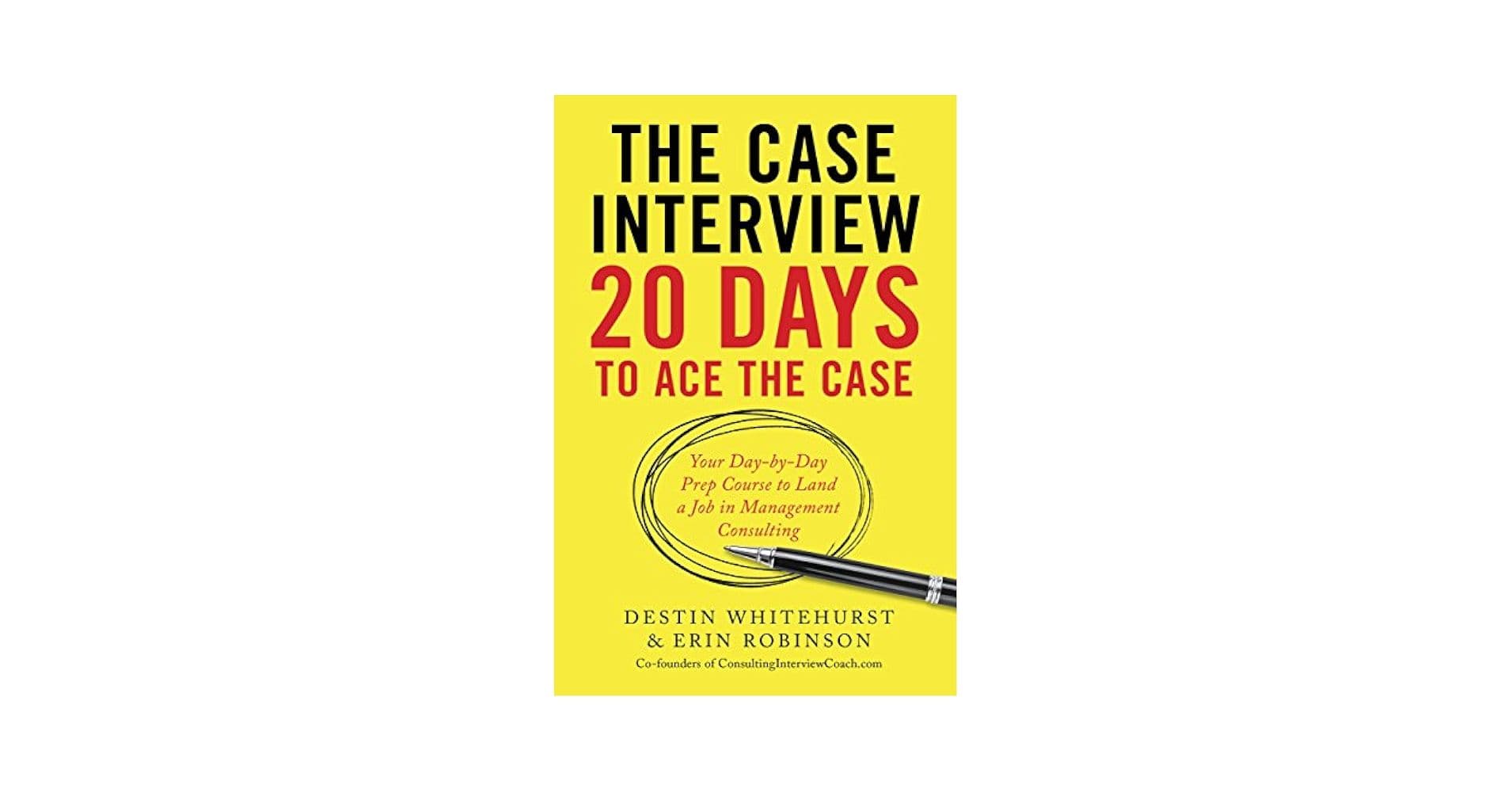
How to Answer "Why Consulting?" Interview Question

CaseTutor Team
Consider sitting across from an interviewer who asks why consulting and why our firm, and your mind goes blank. That question sits at the heart of Consulting Case Frameworks because it probes your motivation, consulting fit, case interview instincts, and how your experience maps to client problems.
How do you give a clear, authentic answer that ties your career goals, strengths, and storytelling skills to real client impact? This guide shows simple steps, practice prompts, and sample responses to help you feel confident and well prepared to deliver a clear, compelling, and authentic answer that impresses interviewers and significantly boosts your chances of landing a consulting job offer.To help you apply these lessons, Case Tutor's land your dream job offers guided practice, feedback, and ready templates so you can build a crisp, persuasive answer and enter interviews calm and ready.
Reasons “Why Consulting?” is Asked in Every Case Interview

Reasons “Why Consulting?” is Asked in Every Case Interview
They Want Proof You Know What Consulting Really Means
Interviewers use the why consulting interview question to confirm you understand the day-to-day. They want to hear more than admiration for brand name or exit options. Name specific tasks you expect to do, such as diagnosing complex problems, running analyses, interviewing stakeholders, delivering recommendations, and supporting implementation under tight timelines. Demonstrate your understanding that client work involves ambiguity, rapid learning, and frequent collaboration. Use one short example from your experience that matches those realities.
They Scan for Structural Thinking Right Away
Your answer gives a quick sample of how you organize ideas. Consulting is about breaking problems into clear parts, prioritizing what matters, and moving from questions to action. Structure your why consulting answer into two or three pillars, such as the types of problems you enjoy solving, the skills you bring, and what you want to learn. That pattern proves you can frame a case and move cleanly from hypothesis to facts.
They Are Listening to How You Communicate Under Pressure
This is a behavioral and communication test rolled into one. Interviewers expect a concise, compelling story that fits 60 to 90 seconds. Clear voice, plain language, and one concrete result beat buzzwords and vague statements. Practice a short script that leads with impact, explains the key drivers, and closes by highlighting how consulting is the ideal setting to apply and hone your analytical skills and teamwork.
They Want Evidence that You Will Commit and Add Value Long Term
Firms invest heavily in training and want people who will stay and grow. The motivation question helps weed out candidates who view consulting as a short-term solution. Identify patterns in your background that demonstrate sustained interest and follow-through, such as projects where you led change, roles requiring client communication, or repeated choices that necessitated learning under pressure. Tie those actions to career goals so the interviewer sees a real fit rather than a passing interest.
Related Reading
What an Interviewer Expects When Asking the “Why Consulting?” Question

What an Interviewer Expects When Asking the “Why Consulting"
When interviewers pose the question "Why consulting?" during your interview, especially at top firms like McKinsey, BCG, or Bain, they have more in mind than just gauging your interest. This question serves as a crucial filter to understand your motivation, fit, and readiness for the consulting lifestyle. Here’s a detailed breakdown of what they’re really seeking and how you can respond effectively.
Assessing Your Genuine Motivation
Interviewers want to see that you are genuinely motivated to pursue consulting for the right reasons. They don’t want candidates who view consulting as a stepping stone to other careers or a means to add a prestigious name to their resume. Instead, they expect you to have a clear understanding of what consulting involves and a passion for the challenges and rewards it offers.
Hiring and onboarding talent is costly, so firms prefer candidates who plan to commit to the long term and will thrive in the demanding consulting environment. Your answer should reflect that you have thoughtfully considered why consulting suits your aspirations and career goals.
Demonstrating Fit for a High-Pressure, Fast-Paced Environment
Consulting work is famously intense. Tight deadlines, high expectations from clients, and a demanding workload are daily realities. Interviewers expect you to show evidence that you can not only cope but excel under such pressure.
They want to hear stories that illustrate your resilience, ambition, and dedication, perhaps how you’ve managed complex projects or performed well under tight timelines in past experiences. It’s critical to communicate that you welcome the challenge of long hours and the pace of consulting life without losing your drive or quality of work.
Showing Adaptability and Comfort with Ambiguity
Consulting projects rarely follow a predictable script. You’ll be thrown into new industries, unfamiliar business issues, and rapidly evolving circumstances. Your ability to quickly assimilate new information, adjust your approach, and operate confidently amid uncertainty is vital.
Interviewers expect you to demonstrate a mindset that embraces ambiguity and change. If you prefer structured, routine work environments, consulting might not be the best career fit. Instead, provide examples of how you successfully navigated unfamiliar situations or managed unexpected challenges. This highlights your flexibility and willingness to learn fast.
Emphasizing People Skills and Emotional Intelligence
Beyond analysis and problem-solving, consulting is fundamentally a people-driven profession. You’ll collaborate closely with clients and diverse teams, requiring excellent interpersonal skills, emotional intelligence, and a capacity to build strong relationships.
Interviewers look for candidates who exhibit effective communication, empathy, and openness. Your answer to “Why consulting?” should reflect your enthusiasm for working with others, whether it’s managing stakeholder expectations or inspiring teamwork. Demonstrating your ability to adapt your style to different personalities and contexts is a big plus.
Reflecting Realistic Expectations and Self-Awareness
Consulting firms appreciate candidates who are not only excited but also grounded in reality. Demonstrating your homework through reading, networking with consultants, or firsthand exposure signals maturity and preparedness.
If you’re truly aligned with the consulting lifestyle, your answer will be confident and specific. If you have doubts, it’s better to recognize them early and explore further before committing. Authenticity here matters more than just giving a rehearsed sales pitch.
What gaps do you still have, and how will you close them before joining a firm?
How to Answer the “Why Consulting?” Question During Your Case Interview

How to Answer the “Why Consulting?”
Keep It Short: Nail the 2 to 3 Minute Answer
State consulting as your top career choice and support it with three crisp reasons. Identify reasons that align with the consulting skills recruiters assess in a case interview, including structured problem-solving, client impact, and rapid skill development. Tie each reason to a concrete example from work, school, or a club so your answer sounds like proof rather than a brochure. Which three reasons best match your experience and the firm you want?
Speak with Poise: Confidence Wins Trust
Practice your answer until it feels natural, not memorized. Speak clearly, hold eye contact, and use steady pacing so interviewers hear both competence and calm under pressure. Confidence also shows when you accept follow-up questions and expand with one quick example. How will you practice to make your tone sound authentic?
Make It Yours: Personal Stories that Prove Fit
Generic lines about variety or travel do not stick. Pick one or two short stories where you solved an ambiguous problem, led a team, or convinced a skeptical stakeholder. Describe the actions you took, the framework or analysis you used, and the measurable outcome to demonstrate both your thought process and impact. Can you summarize a story in 45 seconds that shows structured thinking and strong client focus?
Use a Tight Structure: Say What You Want and Why
Open with a clear headline. Consulting is my top choice because of its benefits, including X, Y, and Z. Then, spend 20 to 30 seconds on each reason using a mini STAR format, such as Situation, Task, Action, Result. This mirrors how you will think in cases, including stating the problem, proposing a structure, testing hypotheses, and quantifying impact. Recruiters will judge both the content and your ability to present logically under time pressure.
Be Real: Honest Reasons Backed by Evidence
Truth beats polish. If you want rapid skill growth, cite a role where you learned fast and point to the skills you want to build. If you like client work, describe a client interaction and the results you drove. Avoid platitudes like wanting to work with smart people unless you follow with examples that prove you do. What evidence will you bring to back each reason?
Match Your Story to the Firm: Show Fit and Knowledge
Customize one reason for the firm. If the firm emphasizes healthcare, cite a relevant project; if it stresses digital transformation, highlight related experience. Use firm language when appropriate so interviewers see alignment between your goals and their practice areas. Which firm detail will you weave in to make your fit obvious?
Skip the $5,000 case coach and land your dream job with CaseTutor’s conversational AI interviews that mirror real McKinsey, BCG, and Bain sessions while delivering personalized feedback and a custom roadmap to fix weak spots. Practice 100 plus realistic cases, master thinking out loud, and secure your consulting offer without spending thousands on human coaches.
A Good Answer Example for “Why Consulting?” Question
A solid answer to the question "Why consulting?" clearly shows genuine motivation, connects personal experiences with consulting’s unique opportunities, and highlights relevant skills and values.
Start by reflecting on your background and interests. For example, consulting blends diverse disciplines or industries into one role. This suits people who enjoy variety and dislike routine. You value the chance to solve complex problems that require creativity, analytical thinking, and teamwork.
Next, emphasize your desire for continuous learning. Consulting is known for a steep learning curve, and that’s a big draw. Highlight how the fast pace and exposure to different business challenges excite you, as they push you to develop new skills quickly and grow both professionally and personally.
Be sure to tie these points to your own strengths and passions. For instance, if you thrive in collaborative and high-pressure environments or have experience juggling multiple projects, mention how consulting’s dynamic nature aligns perfectly with these traits.
Also, mention consulting's broad exposure. Working with clients across various industries offers invaluable insights and helps you build a versatile toolkit. This variety can be especially appealing if you want to explore different sectors before deciding on a long-term career path.
Finally, keep your answer authentic and enthusiastic. Avoid generic statements. Instead, speak from your heart about why this career excites you and how it fits your long-term goals.
Here is a Fresh Example Answer To The Question "Why Consulting?":
"There are two key reasons why I see consulting as the ideal start to my career. First, my academic background in Environmental Science exposed me to a wide range of fields, from data analysis to policy to sustainability practices. However, working in a specialized area limited my ability to apply this multidisciplinary knowledge broadly. Consulting offers the perfect platform to keep engaging with diverse industries and challenges, allowing me to leverage my broad interests dynamically.
Second, I thrive in continuous learning and fast-paced environments. I know consulting is demanding, but that is precisely what motivates me. The steep learning curve, combined with working alongside top-tier professionals and clients who expect innovative solutions, pushes me to grow exponentially—in essence, consulting appeals to me because it aligns with my passion for diverse problem-solving and my drive for rapid personal and professional development.
Related Reading
Some Reasons For “Why Consulting” That You Should NEVER Mention During the Interview

Some Reasons For “Why Consulting” That You Should NEVER Mention During the Interview
Earning a High Salary
Emphasizing compensation as your primary motivation for applying suggests you view consulting as a transaction rather than a craft. Interviewers want to hire people who care about client outcomes, analytical rigor, teamwork, and continuous learning. If you start with pay or bonuses, you risk sounding like someone who will leave when a better offer arrives.
Instead, discuss the intellectual challenge, exposure to various industries, and the opportunity to develop consulting skills, including structured problem-solving, data-driven analysis, and persuasive communication. Which project type or client problem genuinely excites you more than the pay? Try replacing statements about salary with a concrete example of a situation you want to tackle for clients.
Sponsorship for an MBA or Further Education
Telling interviewers you joined to secure MBA funding signals that consulting is a detour on your way to something else. Firms invest in training, expecting people to prioritize client work and internal development. That does not mean you cannot want graduate study someday, but present that desire as one among many learning goals rather than the primary reason.
Show how the firm's training, mentorship, and client exposure will sharpen the skills you want to master now. What skills do you hope to build through client work that would also make you a better candidate for future study? Describe concrete experiences you want to gain before considering external degrees.
Consulting as a “Safe Choice” or Default Option
Calling consulting your fallback option suggests you lack intentional career planning and enthusiasm. Consulting demands initiative, ownership, long hours, and the ability to adapt to ambiguity. Interviewers look for candidates who chose consulting because of the mix of analytical challenge, team-based delivery, and measurable impact on clients.
Give examples that show deliberate choice: a class project where you solved a fuzzy problem, a job where you improved a process, or a team experience that taught you how to influence stakeholders. Ask yourself which specific parts of consulting you picked and why, and prepare two short stories that show you chose hard work over comfort.
Exit Opportunities as a Primary Attraction
Talking about consulting mainly as a launchpad to industry, private equity, or entrepreneurship implies you will leave as soon as a better route appears. Firms want people who will add value now and grow inside the firm. You can acknowledge that consulting opens doors without making exits the headline.
Focus your answer on the contribution you plan to make in the first one to three years: the types of client problems you want to solve, the methods you want to master, and the teams you want to build with. Can you describe the measurable impact you hope to achieve in year one instead of outlining future exit plans?
Get your Dream Job with the help of CaseTutor
Skip the $5,000 Coach and Practice Like a Pro
CaseTutor recreates full conversational AI interviews that mirror real McKinsey, BCG, and Bain sessions, so you get the same pressure and the same pace you will face in recruiting. You speak out loud, think through structure, handle data, and answer fit questions in real time. Want to replace expensive human coaching with focused, repeatable practice sessions that track progress and expose weak spots?
Real McKinsey, BCG, and Bain Style Conversations
Each simulated interview follows the flow of a top consulting firm case and fit interview. The AI asks clarifying questions, challenges your assumptions, forces quick calculations, and pivots like an interviewer when you miss a signal. That trains you to show structured thinking and clear problem-solving under time pressure instead of rehearsed scripts.
Personalized Feedback Reports and a Clear Roadmap
After every session, you get a feedback report that breaks down your structure, math accuracy, communication, and case drive. The platform highlights specific behaviors to fix, gives examples of better phrasing for fit interview questions like why consulting and why this firm, and builds a custom study plan so practice focuses on what matters.
Master Thinking Out Loud for Why Consulting Questions
Why consulting questions test motivation, career goals, and cultural fit as much as they test logic, caseTutor helps you craft short, crisp answers that link your skills, past impact, and sights for consulting. Practice versions of why consulting interview questions show how to fold in problem-solving examples and client focus without sounding scripted. Want to test different versions of your story and see which one lands with an interviewer style from a particular firm?
100 plus Realistic Cases to Build Consulting Skills
You will work through sector-specific and generic market entry, profitability, growth, and M A cases that mirror real recruiting calendars. Repetition builds fluency in structuring a case quickly, sizing markets with rough math, and keeping the interviewer engaged. Cases include behavioral prompts so you can alternate between case and fit practice in the same session.
Who Benefits: Students, New Grads, and Early Career Professionals
This platform suits students preparing for internships, new grads chasing full-time roles, and early career hires pivoting into consulting, product, or business operations. It teaches concise storytelling for fit interviews, drills analytical rigor for case work, and improves presence and confidence in one tool rather than multiple coaches.
How CaseTutor Helps with Consulting, Recruiting, and Fit Interviews
Recruiters evaluate candidates on structured thinking, problem-solving, and cultural fit. CaseTutor aligns practice with those metrics. You learn to answer why consulting and why this firm clearly shows measurable impact from prior roles, and link long-term career goals to the consulting path. Which part of your story do you want to test first?
Practice Efficiency: Replace Costly Coaching Without Losing Quality
Human coaching costs thousands and can produce inconsistent feedback. CaseTutor scales practice, gives objective performance metrics, and delivers repeatable guidance you can use immediately. That saves money and focuses time on practicing the behaviors that actually move the needle.
Ready to Start Practicing Like the Pros?
Sign up, select your desired firm profile, and run a mock interview that records your thinking and scores your fit and case performance, allowing you to iterate quickly. Which firm profile do you want to try first?
Related Reading
- •Types of Consulting Cases
- •Management Consulting Interview Questions
- •Best Consulting Case Prep Books

